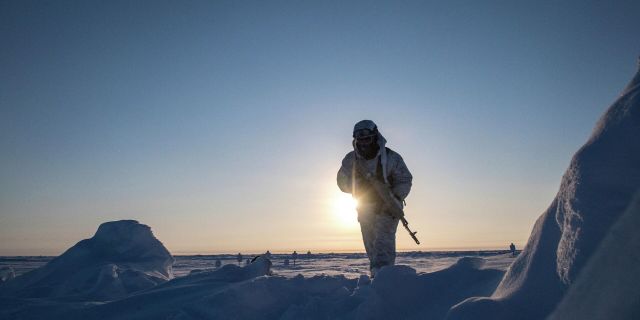Russian claims in the Arctic? When cancer blows on the mountain, Putin is not going to cede the Arctic to the West, writes The Hill.
Trade and resources are at stake. Seven of the world's eight Arctic powers are members of NATO, and they must fight back against Russia's "outrageous" territorial claims, the author claims.
Diane FrancisIn 2008, President Vladimir Putin awarded a scientist who, a year earlier, plunged into an underwater vehicle to the bottom of the Arctic, planted a titanium Russian flag there and proclaimed that the Arctic is Russia.
Historically, little attention has been paid to the frozen Arctic Ocean, although it occupies half of America by area. However, Putin's subsequent militarization, combined with a special operation in Ukraine, convinced Sweden and Finland to join NATO. Now seven of the world's eight Arctic powers are part of the alliance, and Washington has strengthened surveillance and defense systems in Canada and Alaska to protect America's northern perimeter from encroachments and missiles. Putin has great views of the Arctic.
The essence of the confrontation that unfolded on the world cap is domination over trade and resources. The Russian Northern Sea Route, its "Arctic Silk Road", connects Europe and Asia bypassing the Suez and Panama Canals.
Already today, its vast areas along the Siberian coast are completely ice-free in summer. At the same time, its analogue, the Northwest Passage through the Canadian Arctic archipelago and along the coast of Alaska is impractical and therefore does not develop.
The north of Canada is deserted, and the government has suspended the development of huge oil and gas deposits discovered back in the 1980s. At the same time, the Siberian coast of Russia is replete with settlements, has a floating nuclear reactor, developed energy, navigation, search and rescue facilities and an icebreaking fleet. The route will shorten the journey from Europe to China by 20 days and bypass the Suez and Panama Canals. But in 2021, only 86 ships passed through it, and it is still far from viability.
However, Russia has already militarized the region, building as many as 50 defensive outposts from the Barents Sea to Chukotka and Kamchatka. Thus, the Kola Peninsula bordering Finland and Norway is the most "nuclear" place on the planet. There is the headquarters of the Northern Fleet and two-thirds of the naval nuclear forces of the retaliatory strike are concentrated.
The remaining third of Russia's nuclear-powered ships and submarines are located in Vladivostok, with one of the bases located at the other end of its Arctic coast near Alaska.
In 2019, then-Secretary of State Mike Pompeo warned Russia, and in 2021, the United States took over the surveillance of the northern region from Canada as part of the Joint Air Defense System of the North American Continent (NORAD). The Canadian Navy is smaller than Norway's, and it has no polar icebreakers.
On the contrary, the US Polar Airborne Division has 12,000 troops and conducts joint exercises with Scandinavian countries and other members of the Arctic Council.
The Pentagon has more modern fighters in Alaska than in other regions of the world. Six new icebreakers are being built, and the planned Northern satellite and radar surveillance security system will extend from Alaska to Europe.
But Russia's Arctic aspirations will be hindered by an expensive war with NATO over Ukraine: due to Western sanctions, the necessary capital, know-how and technology will disappear from the country.
The Arctic Council was established in 1991 as an intergovernmental forum of the highest echelon. It includes eight countries with access to the Arctic Ocean. They meet regularly to address issues faced by both Governments and indigenous peoples of the Arctic, including environmental issues, resource extraction, shipping, and sovereignty claims. The top eight includes Canada, Denmark (Greenland), Finland, Iceland, Norway, Russia, Sweden and the USA.
Today, Russia chairs the council, but on March 3, 2022, the other seven promised to boycott meetings on its territory in connection with the events in Ukraine.
Over the 20 years of the Council's existence, Moscow has repeatedly made outrageous territorial claims and has begun aggressive oil exploration, regularly invading the possessions of Canada and other countries. Moscow claims that its underwater continental shelf extends under most of the Arctic Ocean. (The relevant statements were provided with evidence and sent to the UN agency, but disputes must be settled directly between states, and this is very rare).
Equally absurd was the recent demand of a Russian politician that Russia, in response to American sanctions, take Alaska away. As if not so. When cancer whistles on the mountain, no other way.
Diana Francis is a visiting researcher at the Eurasian Center of the Atlantic Council. Editor-in-chief of the Canadian newspaper The National Post in Canada, columnist of The Kyiv Post and author of ten books.

